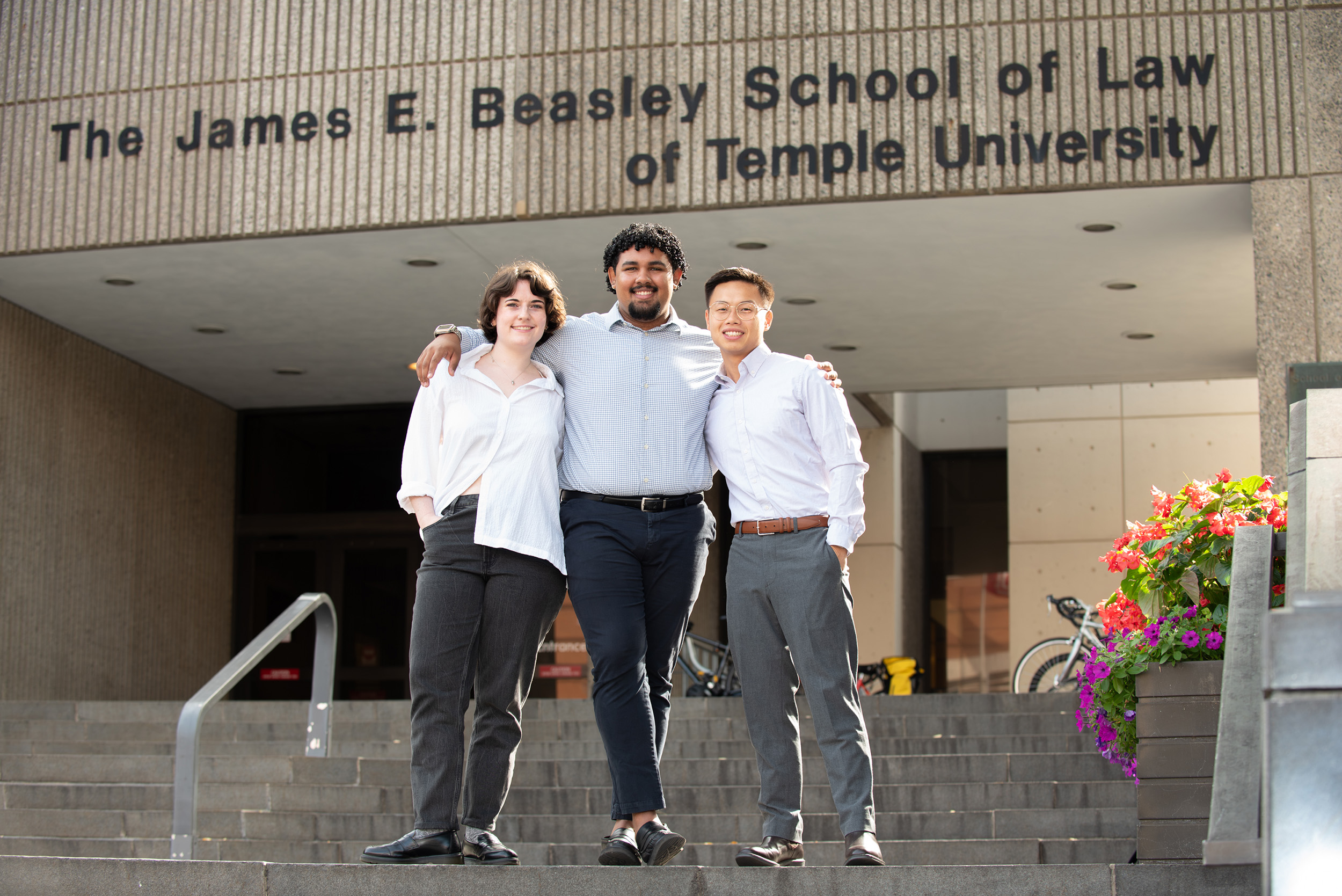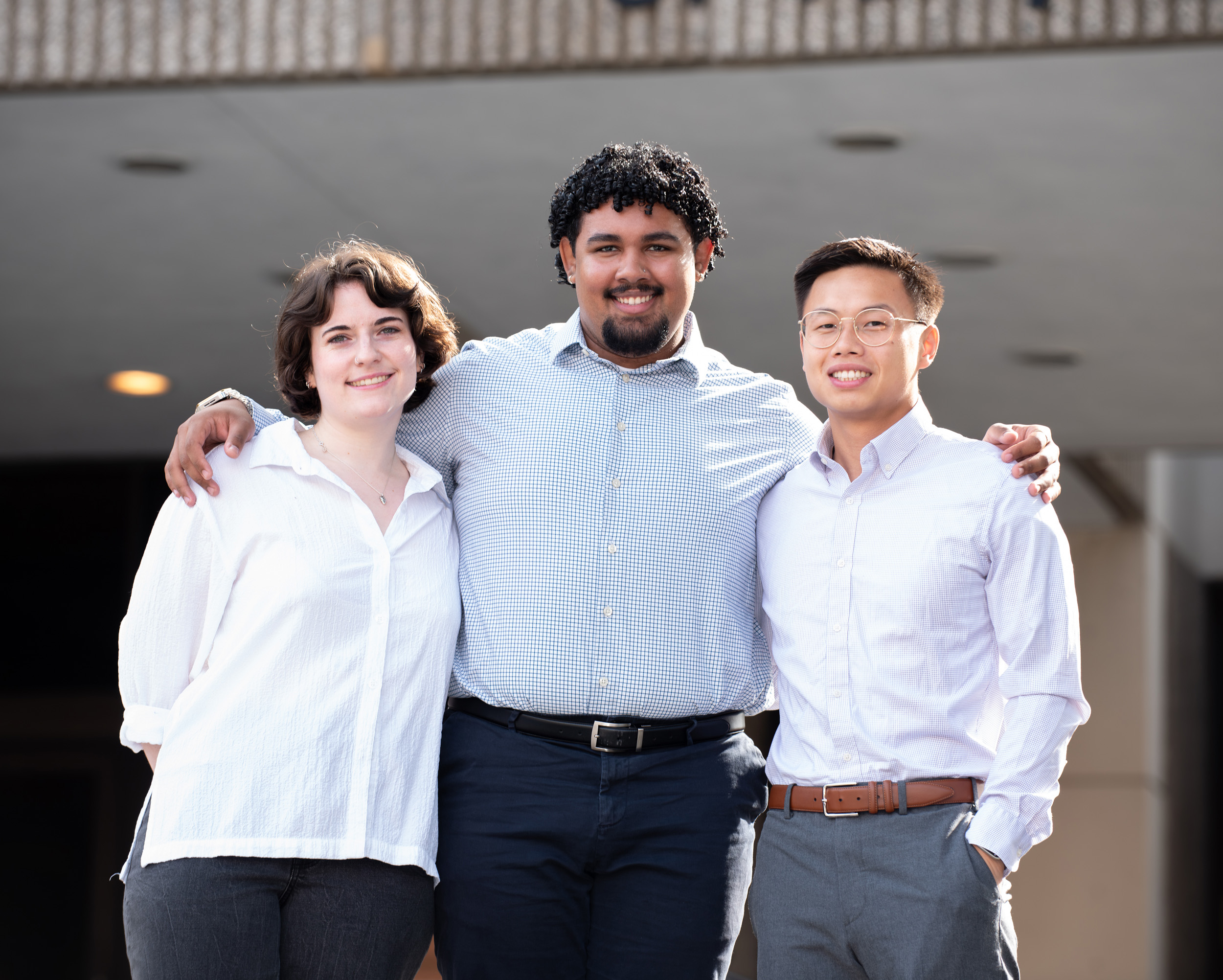
The 2024 EE&CJ Fellows from left to right: Maggie O’Connor, 3L, Bertilio Correa, 3L, and Su Ly, 2L.
Empowering Advocates for Environmental, Energy, and Climate Justice at Temple Law
Climate disruption. Toxic chemicals. Ecosystem degradation. These are not abstract challenges but pressing realities that disproportionately impact poor and marginalized communities. Lawyers working in Environmental, Energy, and Climate Justice (EE&CJ) advocate for legal responses to these issues, and Temple Law is at the forefront of preparing the next generation of advocates. At Temple, students delve into the roles that local, federal, and international law play in addressing environmental injustices—from local battles over cleaning up legacy contamination and creating green spaces to fostering resilience in overburdened communities, and to understanding how federal policies can both promote and hinder the clean energy transition.
The EE&CJ Fellowship program at Temple Law plays a critical role in expanding this work. Fellows collaborate with affiliated faculty to support event planning, content creation, communications, and program development. The Fellowship also offers students an invaluable opportunity to connect theory with practice in environmental advocacy, gaining hands-on experience while contributing to meaningful change.
Voices from the Fellowship
Maggie O’Connor, 3L, began her journey in environmental advocacy during her undergraduate years at Wellesley College, where she focused on divestment from fossil fuels and the transition to renewable energy. After graduation, she continued her community engagement by working at a small garden in West Philadelphia. At Temple Law, Maggie’s interests have broadened to encompass public interest law related to environmental justice, employment, and housing issues.
Since joining the Fellowship, Maggie has been involved in event planning and outreach efforts aimed at strengthening the relationship between students and alumni in the environmental law field.
“As EE&CJ Fellows, we are aiding the department in programming and liaising between students and alums,” O’Connor said. “Right now, Lio, Su, and I are reaching out to alums that work in environmental law to discuss their vision for the future of Temple’s EE&CJ program and where they can fit into that.”
She emphasizes the unique perspective students bring to the table: “We’re adding a student’s perspective to these conversations, which is essential to hosting engaging events that will draw in students.”
Reflecting on her future goals, Maggie says, “I came to Temple Law knowing that I wanted to work in environmental law. Now that I’m here, I’ve expanded my interest to public interest issues more broadly. I’m especially interested in how issues like housing and employment intersect with environmental justice, and how we can take innovative approaches towards progressive policies that help people and the planet.”
Bertilio “Lio” Correa, 3L, grew up in Pleasantville, New Jersey, and served in the Navy before pursuing a degree in International Affairs at Stockton University. His legal studies have focused on environmental racism, the relationship between government regulation and the free market, and energy regulation.
“A lot of the work I do as a Fellow involves strategic thinking. Sustainability is a vital part of decision-making, but it can create barriers to implementation. I like to think my job is to find ways over or through these barriers,” Correa said. “For example, engagement is important to effectuate change, and it increases when there is access to information and to community. As a Fellow, I want to find creative ways to make sure the people interested in this work know where to find us and each other.”

Lio sees his involvement in the Fellowship as a way to develop expertise and network in a crucial area of law. “Being a Fellow allows me to develop an expertise and network in an area of law that has substantial influence on humanity’s ability to live on this planet and gives me a platform to share my experience and that of others. I hope to do that throughout my career as an attorney.”
Su Ly, 2L, brings a wealth of experience from his time as a physical scientist at the EPA and as an environmental educator. Growing up just ten minutes from Temple’s campus, Su pursued undergraduate and graduate studies at the University of Pennsylvania before joining Temple Law.
“I was working with Professor Sinden on the Temple Law Sustainability Committee when she first told me about the Fellowship,” he said. “After conversing with her about the goals of the Fellowship, I got interested because it aligned with some of the work I was already doing with the Temple Environmental Law Society (TELS). After seeing the position advertised on the Student Post, I applied and interviewed for the position.”
As part of his Fellowship duties, Su has been compiling a comprehensive list of alumni involved in environmental law in the Greater Philadelphia area. “One of the EE&CJ program initiatives is to build a strong network of alumni and current students. This task has been super engaging, as I’ve been able to research alumni and the wonderful work they’ve done in the Greater Philadelphia area. As a Fellow, I hope that the program can bring back alumni to convene with current students to encourage more work on EE&CJ within the law school, in the University at large, and the city.”
Su’s vision for the Fellowship reflects his broader commitment to community integration: “For me, sustainability work is successful when a program effectively utilizes the resources and synergies around it. I hope to implement an EE&CJ program that is integrated within the culture of the Law School, as well as long-lasting impacts for the Greater Philadelphia area.”
Building a Legacy of Environmental Advocacy
The EE&CJ Fellowship program at Temple Law is more than just an educational opportunity. It is a platform for students to engage deeply with pressing environmental issues, connect with like-minded professionals, and contribute to a legacy of advocacy that extends beyond the law school into the broader community. As these Fellows work to build bridges between students, alumni, and environmental advocates, they are not only shaping their own futures but also the future of environmental justice and sustainability.
